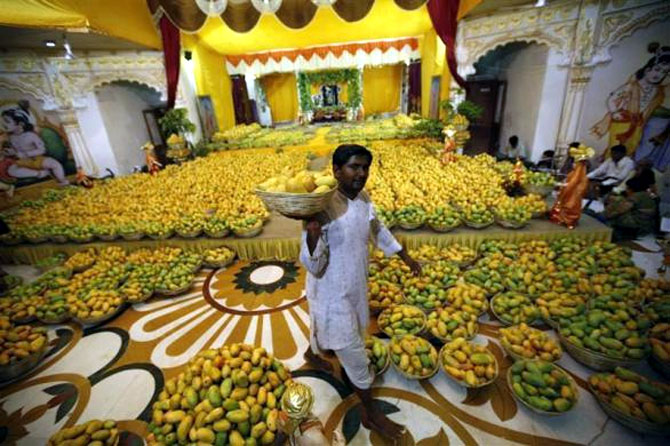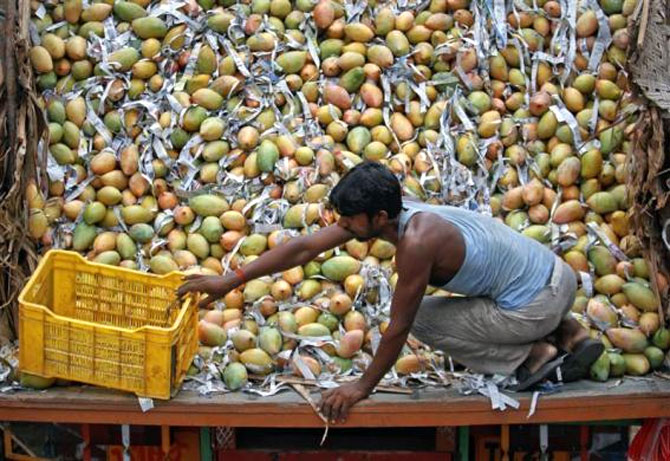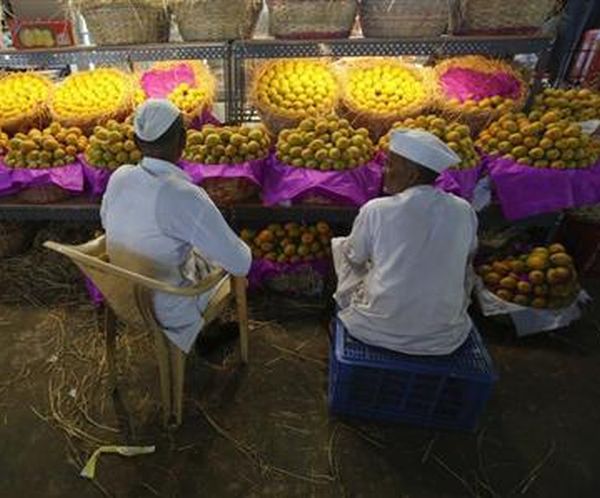 | « Back to article | Print this article |
Mangoes to be out of common man's reach this year
Normally, the prices of the alphonso come down as there is more inflow of fruits into the market. But with the decline in yield it is doubtful if the price will fall much this time.
Mango, the juicy fruit found in tropical and sub-tropical regions, is rightly called the ‘king of fruits’ due to its popularity. No one can refuse when offered a mango. The Dharwad belt is known for the best quality of mangoes, popularly called Alphonso or ‘Aapus’.
However, this season the ‘King of Fruits’ will not be affordable to the common man. The rains have played spoilsport as far as mangoes are concerned. According to official sources, there has been a 30 per cent decline in the yield of mango in the region while the farmers claim the decline higher.
Click NEXT to read more...
Mangoes to be out of common man's reach this year
The superior quality ‘Aapus’ is being sold at Rs 400 per dozen while the middle quality is sold in the range of Rs 250-300 per dozen.
Normally, the prices come down as there is more inflow of fruits into the market. But with the decline in yield it is doubtful if the price will fall much.
Dharwad is known for its mango groves and nearly 12,000 hectares are covered by mango trees. The district also grows another 70 varieties of mangoes like Allumpur Beneshan, Baramasi, Neelgoa, Fazali, Bombay green, Purihaar, Mallika, Neelam and Totapuri among others.
Click NEXT to read more...
Mangoes to be out of common man's reach this year
The Malnad belt of Dharwad district, comprising of Kalghatgi, Alnavar, Mugad, Nigadi, Mavinkopp, Murkatti, and Salakinkopp in Dharwad taluk, Kundgol and parts of Hubli taluk are known for their high quality Aapus mangoes.
Mango groves are also found along the Pune- Bangalore stretch of a National Highway 4 from Dharwad to Belgaum till Kittur.
The rains that lashed the region in April this year have brought some respite to the people reeling under the scorching heat.
However, the same showers have dashed the hopes of mango lovers who were looking forward to tasting a variety of mangoes this season.
Click NEXT to read more...
Mangoes to be out of common man's reach this year
The raw mangoes have started to wither due to the recent rains accompanied by a hailstorm which lashed the rural areas.
The farmers who suffered crop loss due to the drought-like situation were hoping that their loss would be made good by mango. However, the rains have dashed their hopes.
The first yield was expected in next 15 days. “But, as the taluk received hailstorm, almost 40 per cent of the yield has been damaged,” said Prabhakar, owner of the mango plantation.
This ‘Aapus’ breed is unique as it produces fruits once in two years. Last year, the farmers did not receive a good yield. Hence, we were expecting a better yield this season.
Click NEXT to read more...
Mangoes to be out of common man's reach this year
Nagappa, a mango farmer, complained that the contractors who had taken the trees on lease were refusing to pay the agreed sum citing a decline in the yield.
“The cultivators have the habit of leasing out the mango crop at the flowering stage itself. The contractors pluck the fruit before they are ripe and use calcium carbide to ripen them artificially.
This deprives consumers of the real taste of the fruit and also harms their health,” said Anand Mokashi, a professor of the department of Horticulture in the University of Agricultural Sciences in Dharwad.
Farmers should be informed about ethylene gas treatment for natural ripening of the fruit, he added.





